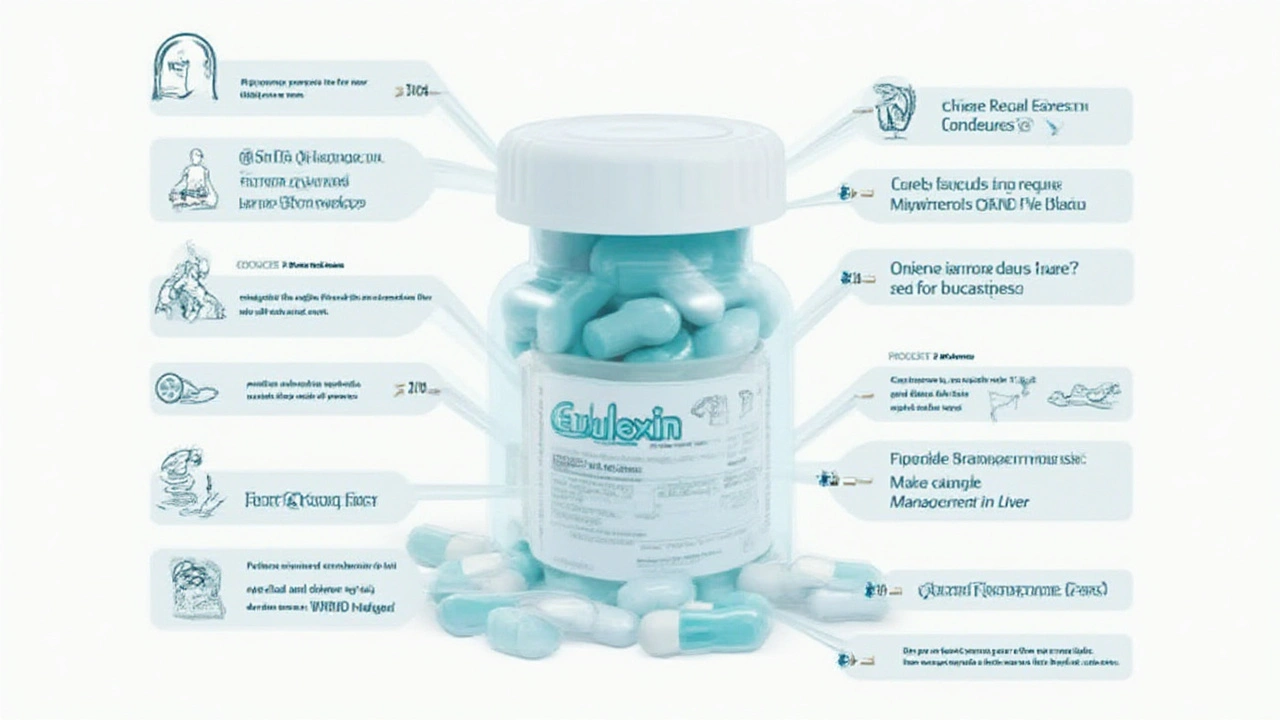My best friend’s dad spent days confused about pill bottles, wary of promises on labels, and wishing his questions didn’t sound silly. Eulexin burst onto the prostate cancer scene decades ago. Back then, it was hailed as a real hope for men dealing with late-stage disease. Flutamide, the drug behind Eulexin, stood out because it fought cancer differently—by blocking the male hormones that drive tumor growth. But what’s the deal with Eulexin today? Does it live up to its reputation in 2025? Let’s break down the real facts, clear up myths, and make sure you have more than just the basics to go on.
How Eulexin (Flutamide) Works in the Body
Eulexin hangs out in a class of meds called anti-androgens. Instead of killing cancer cells directly, it plays interference with hormones—the sneaky messengers that tell some cancers to grow faster. Specifically, it blocks the action of androgens like testosterone. Androgens aren't bad guys by default; they’re just being hijacked by cancer cells. What flutamide does is bind to those hormone receptors, stopping the signal before the tumor gets the memo to multiply. You’ll usually see Eulexin paired up with other treatments, especially something called LHRH agonists, which reduce how much testosterone the body makes. Doctors call this combo therapy, and it works a bit like blocking invaders at the gate and cutting off the supply line at the same time.
This precision might sound high-tech, but flutamide’s roots go all the way back to the late 1970s. It was one of the first drugs proven to slow down the progression of advanced prostate cancer. Studies showed men on flutamide + an LHRH agonist had better survival times compared to the previous standard. Still, it’s not the latest model—newer anti-androgens are now on the market, and some work more efficiently. But doctors keep Eulexin in the arsenal because certain men respond well to it, or can’t tolerate newer meds.
Knowing how flutamide works also means knowing the reality of what it can and can’t fix. This drug won’t shrink a prostate overnight or "cure" metastatic cancer. What it does is help starve tumors of their favorite fuel, slowing down the spread, shrinking some tumors, and buying time for other treatments to work. It’s also sometimes used when cancer becomes resistant to other hormonal therapies. If your doctor starts you or someone you care about on Eulexin, it's usually because they've weighed the risks and the odds, and still believe it can make life a bit longer—and hopefully more comfortable.

Getting the Most from Your Medication: Dosage, Monitoring, and Daily Tips
The standard dose for Eulexin is 250mg, taken three times a day. Yes, you read that right—three times, spaced out, morning, afternoon, night. Consistency is critical. Skipping doses leads to wobbly hormone levels and gives cancer room to regroup. If you forget a pill, don’t double up the next time. Just take your next dose on schedule. I know folks who set phone alarms or even use pillboxes with timers just to stay on track. Little steps like this help a lot and reduce stress.
Doctors will ask for regular bloodwork when you’re on flutamide. This isn’t just busywork. Eulexin can put a strain on your liver, so liver function tests (LFTs) are part of routine care. And yes, skipping these visits can let side effects sneak up and cause problems before you even feel a thing. Other checks might include kidney function, PSA levels (that’s a marker for prostate cancer), and sometimes testosterone checks. If the lab results go haywire, your doctor might tweak the dose or switch you to something else.
This is a medicine that needs to be taken with food or a glass of milk, which helps with absorption and cuts down on tummy upset. Some folks notice their urine taking on a dark yellowish color. That’s usually harmless, but always worth mentioning at your visit. One trick I picked up from a patient group: keep a diary of side effects. Even small changes—appetite, mood swings, sleep—can mean something to your oncologist. Jot these down and bring them to appointments. It makes the conversation faster and gives you more control over your care.
You’re also looking at possible interactions with other prescriptions, supplements, or even fancy herbal teas. Flutamide doesn’t always play nice with blood thinners, certain antidepressants, or seizure meds. Always check with a pharmacist if you add something new. This tip comes straight from Alan, my spouse, who manages his parents’ med lists for their peace of mind.
Here’s a quick-reference table for the basic Eulexin regimen:
| Dose | Frequency | Main Check-Ups | Take With Food? |
|---|---|---|---|
| 250mg | Three times a day | Liver function, PSA, kidney function | Yes |

Possible Side Effects and Safety Considerations
No sugar-coating here: Eulexin (flutamide) can trigger some strong side effects, and everyone’s experience is a bit different. The big one doctors worry about is liver toxicity. Warning signs include yellowing eyes or skin (think jaundice), extreme fatigue, nausea, or dark urine. These side effects tend to pop up a few weeks to months after starting, so ongoing monitoring is huge. If these symptoms appear out of nowhere, stop the medication and call your medical team—no waiting it out. In most cases, issues can be managed if caught early.
Other common hiccups are breast tenderness and swelling (gynecomastia), hot flashes, and tummy problems like diarrhea. Some men lose their drive for sex or might get a rash. You might read that these side effects mean the drug is “working,” but that’s not quite true. Each person’s response to anti-androgens is unique; some breeze through, while others struggle. Talking with your care team about side effect management is as important as showing up for scans. There are meds and lifestyle tweaks (like switching up diet or using cool packs for hot flashes) that make side effects livable.
Women who are or could become pregnant must never handle Eulexin tablets. The drug can cause severe birth defects, even if it’s just through skin contact. Always keep the medication away from children and pets. For the forgetful among us: a locked drawer beats the medicine cabinet.
Some people worry about long-term risks. There’s been talk of rare cases of lung issues (interstitial pneumonitis) and even blood disorders, but those hit less than 1 in 10,000 users. Read the package insert, yes, but don’t let Google’s worst-case horror stories dictate your peace of mind. Instead, keep your communication open with the doctor—nothing replaces their day-to-day experience with real patients.
If you ever need to stop flutamide, don’t just stop cold turkey unless your doctor says to. The rebound hormone surge can actually help cancer grow faster. The safest way is a slow taper, with another medication overlapping for a while.
Here’s a summary of common reported side effects and how often they show up, based on a widespread clinical study:
| Side Effect | Approx. Incidence | Tips |
|---|---|---|
| Liver function changes | 5-10% | Regular blood checks, report jaundice |
| Breast tenderness/swelling | 30-40% | Wear loose shirts, ask about Rx meds |
| Hot flashes | 30-35% | Cool packs, hydration |
| Diarrhea | 15-20% | Bland diet, hydration |
| Lack of sex drive | 10-20% | Counseling, partner support |
Deciding to start Eulexin isn’t about choosing the "right" or "wrong" drug. It’s about finding something that works for your body, your life, and your goals. Ask for printed info. Bring along a friend or family member (virtually or in person) for appointments—that second set of ears helps more than you realize. There’s a ton of info out there, and it gets overwhelming. But the more you know, the more you can steer your own path. If you ever feel lost, reach out. There are patient groups and oncology nurses who’ve seen it all and will gladly answer that so-called "dumb" question. Nothing about cancer—or its treatments—should force you to go it alone.

Aarti Ray
i read this while waiting for my mom's chemo appointment and honestly it made me feel less alone
my dad took eulexin for 3 years and we never knew what to expect day to day
the dark urine thing freaked us out at first but the nurse said its normal
just keep checking in with your doc and dont be shy to ask questions
Alexander Rolsen
This drug is outdated. Why are we still using 1970s tech when we have apalutamide and enzalutamide? The liver toxicity alone makes this a joke. If your doctor prescribes this, ask them why they're not using the real meds.
Leah Doyle
this made me cry a little 😭
i lost my uncle to prostate cancer last year and he was on eulexin for 18 months
he kept a little notebook just like the one mentioned here
he wrote down every hot flash and every time he felt tired
we used to read it together at dinner
it made him feel like he had control
thank you for writing this
Alexis Mendoza
i think the real question is not whether eulexin works
but why we still think of cancer as something to fight
instead of something to live with
the body isn't a battlefield
it's a home
and sometimes the best medicine is just listening to it
Michelle N Allen
i skimmed this because it was too long and honestly i dont care about the liver stuff unless its gonna kill me
my uncle took it for like 5 years and he was fine
he just had hot flashes and got a little soft in the chest
so whatever
just tell me if it helps or not
Madison Malone
if you're reading this and you're scared
you're not alone
my husband started eulexin last year and we both panicked
but we found a local support group and now we go every other week
they have coffee and cookies and no one talks about cancer unless someone wants to
you deserve peace too
Graham Moyer-Stratton
Flutamide is obsolete. Modern medicine has moved on. Stick to the science, not nostalgia.
tom charlton
I would like to extend my sincere appreciation to the author for the thorough and compassionate presentation of this therapeutic modality. The inclusion of practical monitoring protocols and the emphasis on patient-centered communication represent a paradigm of clinical excellence. I have shared this resource with our oncology nursing team for educational purposes.
Jacob Hepworth-wain
i used to work in a pharmacy and saw so many people on this
most of them were older guys who just needed something that worked without breaking the bank
newer drugs cost 10x more
and if your liver is okay and you're not having wild side effects
why change it
its not about being cutting edge
its about keeping life normal
Craig Hartel
my dad started this last year and now he's gardening again
he says the hot flashes are annoying but he'd rather sweat than be in pain
we keep a little calendar where he marks good days with a sun and bad days with a cloud
it helps us see the big picture
thank you for writing this like a human not a textbook